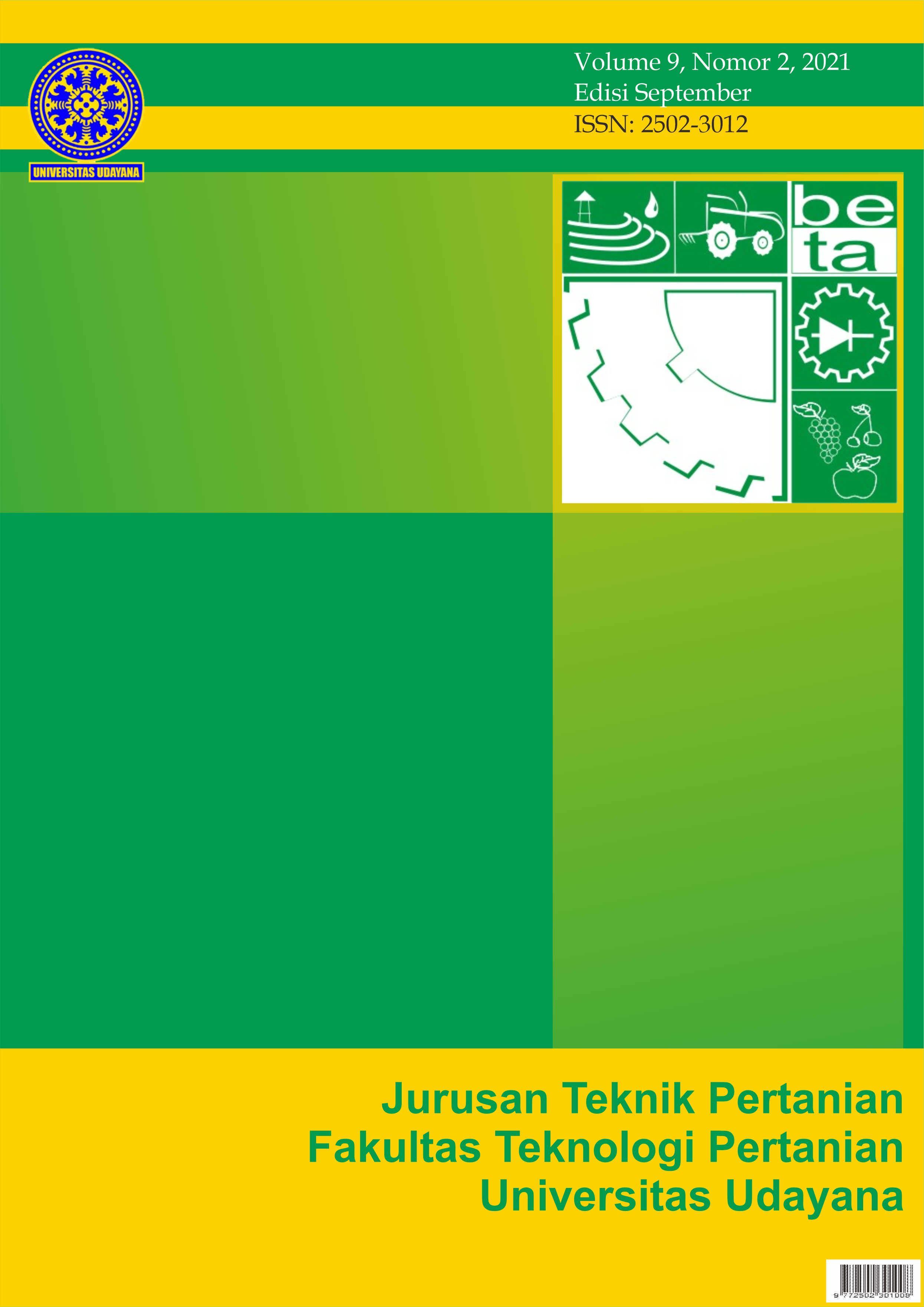Pengaruh Pelapisan Gel Lidah Buaya dengan Campuran Asam Askorbat dan Kalium Sorbat terhadap Susut Bobot, pH dan Organoleptik Buah Melon Potong Segar
Abstract
ABSTRAK
Buah melon yang telah mengalami pengolahan minimal memiliki sifat mudah rusak (perishable) dengan masa simpan yang relative singkat. Penelitian ini bertujuan untuk mengatahui pengaruh pelapisan gel lidah buaya dengan campuran asam askorbat dan kalium sorbat terhadap susut bobot, pH dan organoleptik buah melon potong segar atau proses minimal. Penelitian menggunakan Rancangan Acak Lengkap (RAL) terdiri dari dua faktor perlakuan yaitu konsentrasi asam askorbat (0%, 1.5% dan 3%) dan kalium sorbat (0%, 0.2% dan 0.4%). Percobaan ini diulang sebanyak tiga kali dengan suhu penyimpanan 5±2?C. Hasil penelitian menunjukkan asam askorbat dan kalium sorbat berpengaruh nyata terhadap nilai susut bobot, pH dan atribut organoleptik buah melon potong segar. Asam askorbat dan kalium sorbat mampu menghambat kehilangan bobot, mempertahankan nilai organoleptik dan menurunkan nilai pH sehingga aktivitas pertumbuhan jamur dan kapang terhambat pada buah potong tersebut. Gel lidah buaya dengan penambahan asam askorbat 3% dan kalium sorbat 0,2% merupakan perlakuan yang memberikan nilai atribut organoleptik terbaik selama penyimpanan. Kombinasi ini mampu mempertahankan nilai warna dan tekstur hingga hari ke 14 serta mempertahankan aroma hingga hari ke 10.
ABSTRACT
Melon fruit which is undergone a minimal process is easy to damage (perishable) with short shelf life. This study aims to determine the effect of coating aloe vera gel with a mixture of ascorbic acid and potassium sorbate on weight loss, pH, and organoleptic of fresh-cut melons. This study using a completely randomized design (CRD consisted of two treatment factors, namely ascorbic acid (0%, 1.5%, and 3%) and potassium sorbate (0%, 0.2% and 0.4%)). The experiment was replicated three times with a storage temperature of 5 ± 2?C. The results showed that ascorbic acid and potassium sorbate significantly affected the weight loss, pH, and organoleptic values ??of fresh-cut melons. Ascorbic acid and potassium sorbate can inhibit weight loss, maintain organoleptic values ??, and reduce the pH value of fresh-cut melons so that the activity of fungal and mold growth is inhibited. Aloe vera gel with the addition of 3% ascorbic acid and 0.2% potassium sorbate was the treatment that gave the best organoleptic value during storage. This combination can maintain the value of color and texture up to day 14 and maintain aroma until day 10.
Downloads
References
Barrett, D. M., Beaulieu, J. C., & Shewfelt, R. 2010. Color, flavor, texture, and nutritional quality of fresh-cut fruits and vegetables: Desirable levels, instrumental and sensory measurement, and the effects of processing. Critical Reviews in Food Science and Nutrition, 50(5),:369–389.
BPS. (019. Produksi Tanaman Buah-buahan. In Badan Pusat Statistik. https://www.bps.go.id
Darmajana, D. 2017. Pengaruh Pelapis Dapat Dimakan dari Karagenan terhadap Mutu Melon Potong dalam Penyimpanan Dingin Effects of Carrageenan Edible Coating on Fresh Cut Melon Quality in Cold Storage Doddy Andy Darmajana*, Nok Afifah, Enny Solihah, Novita Indriyanti. Agritech, 37(3): 280–287.
Kader, A. A. 2013. Postharvest Technology of Horticultural Crops - An Overview from Farm to Fork. Journal of Applied Sciences and Technology, 1(1): 1–8.
Khairi, A. N., Falah, A. F., & Pamungkas, A. P. 2017. Analisis Mutu Pascapanen Melon (Cucumis melo L.) Kultivar Glamour Sakata Selama Penyimpanan. CHEMICA: Jurnal Teknik Kimia, 4(2): 47-52.
Marwina, R., Agustina, R., & Putra, B. S. 2016. Perubahan Mutu Tomat (Lycopersicon esculentum Mill.) Dengan Variasi Konsentrasi Pelapisan Gel Lidah Buaya (Aloe vera L.) Dan Suhu Penyimpanan. Jurnal Ilmiah Mahasiswa Pertanian, 1(1): 985–994.
Misir, J., H. Brishti, F., & M. Hoque, M. 2014. Aloe vera gel as a Novel Edible Coating for Fresh Fruits: A Review. American Journal of Food Science and Technology, 2(3): 93–97.
Nasution, Z., Ye, J. N. W., & Hamzah, Y. 2015. Characteristics of fresh-cut guava coated with aloe vera gel as affected by different additives. Kasetsart Journal - Natural Science, 49(1): 111–121.
Nurhayati, Hanum, T., Rangga, A., & Husniati. 2014. Optimasi Pelapisan Kitosan Untuk Meningkatkan Masa Simpan Produk Buah-Buahan Segar Potong. Jurnal Teknologi Industri Dan Hasil Pertanian, 19(2):161–178.
Olivas, G. I., Rodriguez, J. J., & Barbosa-Cánovas, G. V. 2003. Edible coatings composed of methylcellulose, stearic acid, and additives to preserve quality of pear wedges. Journal of Food Processing and Preservation, 27(4): 299–320..
Oms-oliu, G., Soliva-fortuny, R., Martı, O., & Rojas-grau, M. A. 2009. Review The use of packaging techniques to maintain freshness in fresh-cut fruits and vegetables : a review. 875–889.
Raghav, P. K., Agarwal, N., Saini, M., Vidhyapeeth, J., & Vidhyapeeth, J. 2016. Edible Coating of Fruits and Vegetables : I Nternational Journal of Scientific and Modern Education, January. 1(1): 188-214Salem, T. N., & Kassem, A. M. (2018). Nonlinear finite element analysis of foundations on preloaded soft ground. ISRM International Symposium 2000, IS 2000, 30(1), 35–38.
Suriati, L., Mangku, I. G. P., & Rudianta, I. N. (2018). The characteristics of Aloe vera gel as an edible coating. IOP Conference Series: Earth and Environmental Science, 207(1):1-6.
Suriati, L., Utama, I. M. S., & Suardani, A. 2020b. Edible Coating Base on Aloe Gel with Additives on Strawberry Fruit. SEAS (Sustainable Environment Agricultural Science), 04(01): 18–25.
Suriati, ., Utama, I. M. S., Harjosuwono, B. A., & Gunam, I. B. W. 2020c. Incorporating additives for stability of Aloe gel potentially as an edible coating. AIMS Agriculture and Food, 5(3): 327–336.












 Jurnal BETA (Biosistem dan Teknik Pertanian)
Jurnal BETA (Biosistem dan Teknik Pertanian)


